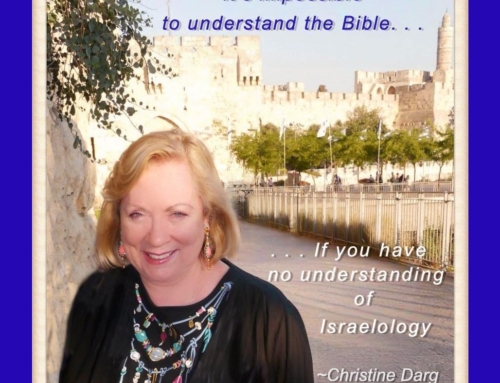Editor’s Note: The following column is reprinted with permission from Root Source co-founder Bob O’Dell.
For a Jerusalem Channel video on the subject of the evil tongue, click here.

Bob O’Dell
By Bob O’Dell, Root Source
Unfortunately, all is not right with the world. And neither is everything perfect in the ranks of the people of God. So while it is good and right to dwell on what is good and right, there comes a time when we must allow the light of God to shine on those places that are not perfect, where we are missing the mark, and expose them.
In this series of 52 columns, that time, that pivot point has now come. God forbid that we should stay in the negative for the rest of this series, but I now feel called to share with you some of the weight I carry. You can be the judge of whether that which I carry is my own, or also from God.
How Does One Talk about the Negative?
When one speaks of that which is “not right”, the number of ways one can stumble in doing so is quite long. And this precarious position of “how does one talk about the negative” is exactly where we shall begin.
The world today is handing out PhDs right and left on negativity. Public figures seem to compete for the title of how vicious they can be to each other. Yet, the ranks of public figures are small compared to the rest of us. Compared to such people, most of us are simply floating on the ocean of communication and thought while public figures cast giant boulders at each other from afar, that come slamming down into the water nearby to their opponents, while the rest of us are rocked by the waves their verbal bombardments.
But, if we look carefully enough, we will find a smaller body of water, a lake or maybe even a pond where we b ecome the public figures. We may not be players in our local government, but when it comes to our churches, our congregations, and certainly our homes, we become those public figures.
Gidon’s Evil Speech Speech
With that image in mind, I would like to tell you about my early days with Gidon Ariel. We were discussing the possibilities for what Root Source might become, and what problems Root Source might solve. In the end we decided that the first course that Gidon would teach would be on prayer: Pray Like a Jew was what we ended up calling it. But, that was not the first idea that ever bubbled to the surface. The first idea was about “evil speech”. Here’s the story.
I don’t remember what sparked the conversation, but I remember almost exactly where we were driving in the neighborhoods of Jerusalem when Gidon first gave me “the evil speech speech”. I will suppose that I was doing my “marketing thing” and trying to consider how certain people would react to the idea that would become Root Source. Did I ask Gidon a question about somebody he knew? Did I begin to tell Gidon a story about somebody I knew? I don’t know, but what I remember is that he told me that in Judaism, they are taught not to speak evil about others.
I was stunned.
Gidon went on to explain that the term lashon hara (literally “evil tongue”) is considered to be a very serious sin in Jewish tradition. He said it is fine to speak positively about a person, but especially when a person is out of the room, one must not speak in a derogatory way about them.
I remember asking: “Then how do you communicate the truth about a situation, if you cannot say anything negative about them?”
I’ll reveal his answer in a moment. But first, let me quote the passage that Gidon explained to me concerning the sin of lashon hara and why it is so memorable to the Jewish people.
Miriam and Aharon spoke against Moshe because of the Cushite woman he had married: “He married a Cushite woman!” Numbers 12:1 (TIB)
As the cloud withdrew from the Tent, there was Miriam stricken with snow-white scales! When Aharon turned toward Miriam, he saw that she was stricken with scales. Numbers 12:10 (TIB)
Miriam was one of the most important persons in the ranks of Israel. Without her, Moses would never have become the daughter of the princess of Egypt. Miriam was a prophetess herself. She was a leader of the people. She is legendary for singing a song to the people after the crossing of the Red Sea:
And Miriam chanted for them: Sing to Hashem, for He has triumphed gloriously; Horse and driver He has hurled into the sea. Exodus 15:21 (TIB)
And yet a person of her stature was massively humbled in the sight of God and all the people because of what she said about her youngest brother. As Gidon began to tell me about these things, I began to have two significant thoughts.
First, what he described was way, way different from what I saw happening in the church. We who “know” that we are not supposed to gossip, have defined that sin so narrowly that we have been tearing down each other almost constantly in the vein of simply “relating the facts”.
Second, I realized that this is a very good example of “the fear of the Lord” in operation. The good kind of fear. If Jewish schoolchildren are taught that the sin of evil speech can result in disease of the skin, that can be a very strong deterrent.
That’s when I said to Gidon:
“I think this is the first teaching you should give on Root Source.”
In the end, we decided to go in a positive route and just look at the whole topic of prayer. But, I never forgot the power of the contrast I was seeing between the practice of the Jewish world and the Christian world as I knew it.
Bob’s Evil Speech Speech
We are killing each other with our words today. Our culture in America has become divisive and vicious. If that’s true, then according to the New Testament:
For the time is come that judgment must begin at the house of God: and if it first begin at us, what shall the end be of them that obey not the gospel of God? 1 Peter 4:17 (KJV)
In the Christian world, we are hurting each other with our words today as well. We are not standing out from the culture as much as we should. If the culture is at fault, we cannot claim that as an excuse. God will not withhold judgment from the house of God before he judges the larger cultural problem.
If God would grant me one request, one answered prayer, one sin to fix in the church, one area of life in which I could pray that we can raise our standard to the level of the Jewish teaching around the world, I think that ridding ourselves of evil speech would be my request. Why?Because it prevents growth in every other area. The speaking against our brothers and sisters not only tears them down (whether they hear it or not), it tears us down in the very same moment. It is a double destruction. And it holds back the blessing that God would otherwise desire to give. Actually, Gidon adds that the Talmud Archin 15b says that evil speech is a triple destruction. It kills three: the one who says it, the one who is spoken about, and the one who hears it!
I wonder how much skin disease, physical and emotional irritation and related factors that we observe in our friends and family and ourselves, might not be a result of evil speech.
And so, as we embark on a discussion of things that are not right in the house of God, I also carry the responsibility to do so without engaging in evil speech.
Gidon Answers my Question
I promised you an answer to the question I asked Gidon:
“Then how do you communicate the truth about a situation, if you cannot say anything negative about a person?”
I don’t even remember how Gidon answered me that question in the car, but I suppose I don’t remember it because it wasn’t highly satisfying at the time. Yet I got my answer over time while working with him daily, and by watching him walk it out in his life.
Now, before I give you this revealed answer, please remember two things. First, this is the first time in five years that I have ever attempted to describe it in words. I’m probably not going to do it justice. Second, even as Gidon’s words in the car could not adequately describe the answer, neither will my words adequately describe the answer. Now, with those caveats, here is what I learned.
- ● Gidon doesn’t make sweeping generalizations about people. He doesn’t categorize them or label them, unless it is positive.
- ● He treats a negative situation as having a lack of the positive. For example, he might have said in the early days of Root Source: “I just don’t think they are going to be able to make time to meet with us right now.”
- ● When it is absolutely essential to describe a characteristic that is lacking (which is rare that it is essential), it is described in the kindest way possible, or from the standpoint of the difficult situation from which they have come.
- ● Gidon refers to the future optimistically. Nobody is ever written off, ever! “Let’s give it some time and then we will try again,” is something I can hear him say.
- ● He puts the best face on something that is lacking. Is he just a positive person? No, I really think it is more than that. I think it is a decision.
On my part, I have learned that my role in such a situation is:
- ● Remember that not every question that comes into my head needs to be asked. Have you ever considered this in your dealings with other people? Evil speech often comes as a result of the answering of a question. I know that in many, many cases Gidon can say more about a given situation. But do I really need to know? What if I ask him a question that were to touch on an inner frustration? Is such a question building up God’s kingdom?
- ● It really comes down to trust. Can I trust that Gidon’s perspective on a situation, for instance regarding the Jewish world, is sufficient?And likewise, when the situation is reversed and involves the Christian world, Gidon allows me to characterize a situation in a way that is respectful to the Christian world. He does not press me for intimate details, except when the situation is all-positive! He loves a detailed story with a beautiful ending!In speaking these kind words about Gidon’s character, I suppose if you are like me, you might be wondering: Is Gidon the norm in the Jewish world, or is Gidon somehow “better than average” in this matter of lashon hara?
If I asked Gidon that question, my guess is that his answer would be what I heard him say on camera once: “I’m inspired by the positivity of my friend Yehuda Glick, a man who has made a career out of making a decision to never say anything negative about anybody.”
In other words, Gidon’s kind deflection to my question would carry within it the real answer that was needed: “Is that even the right question to be asking?”
Shalom.







Leave A Comment